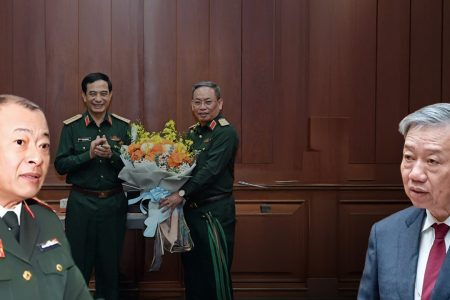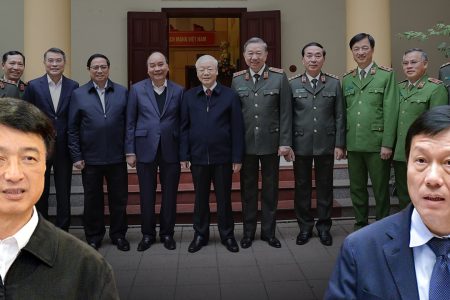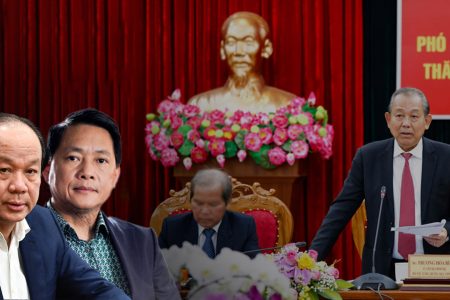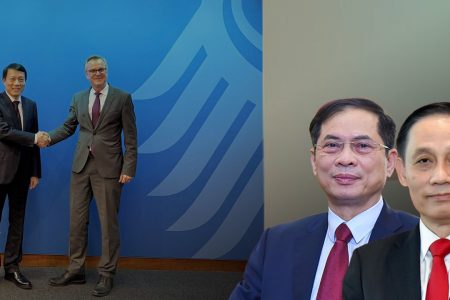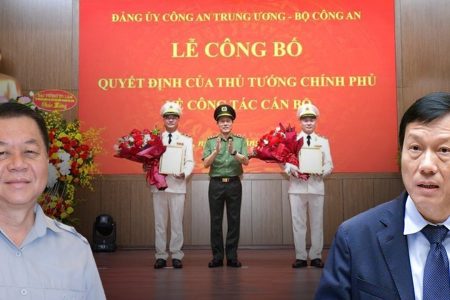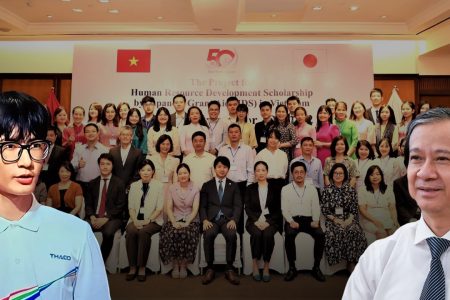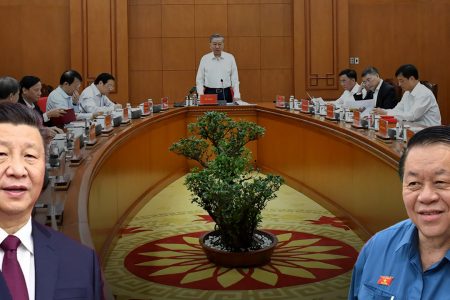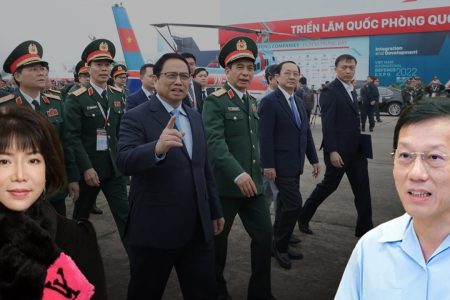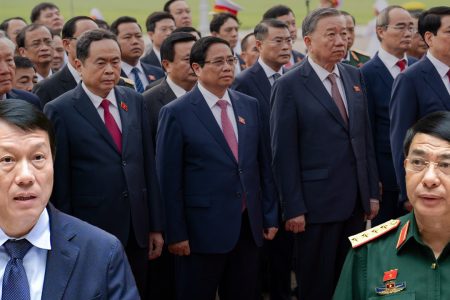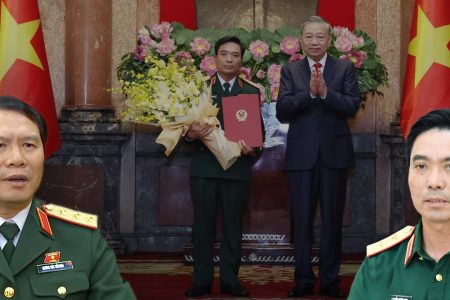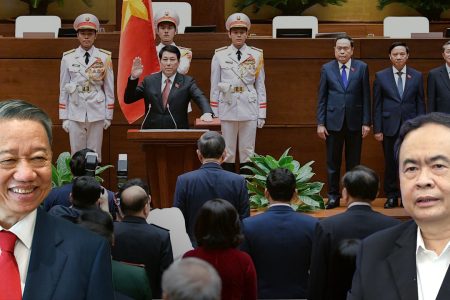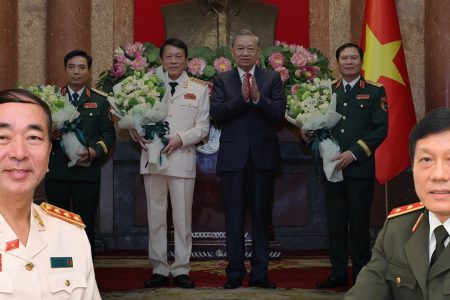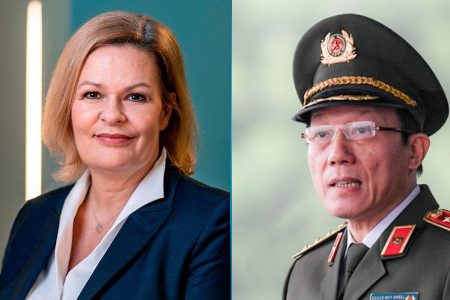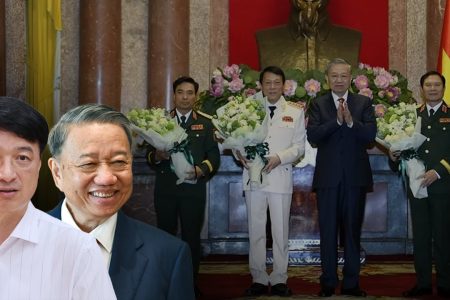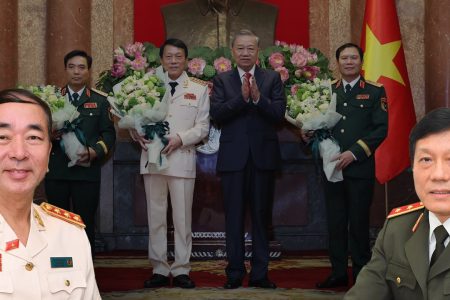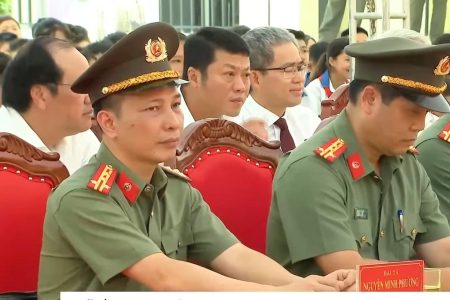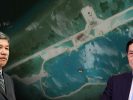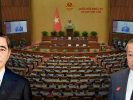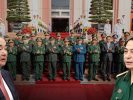
General Secretary Nguyen Phu Trong’s visit to Beijing on October 30 at the invitation of Chinese President Xi Jinping has caused attention and comments expressing concern that Hanoi seems to be leaning too much towards Beijing.
The head of the Communist Party of Vietnam is the first foreign leader to visit China after the 20th National Congress of the Communist Party of China when Xi Jinping won a third term as General Secretary, and according to some international experts, it is likely that Mr. Xi will stay in this position for the rest of his life.
State media of Vietnam reported that on October 30, President Nguyen Xuan Phuc and Prime Minister Pham Minh Chinh and many high-ranking officials went to Noi Bai International Airport to see off the delegation – an unprecedented event in the past when two of the four pillars sent a Party leader off on a business trip abroad.
Facebooker Thanh Mai with more than 52,000 followers, comments from the President and Prime Minister going to the airport to see Mr. Trong off, shows that the trip “is a testament to the high unity of the Vietnamese leadership as well as the leading role of General Secretary Nguyen Phu Trong in Vietnam’s politics.”
Holding the solemn and unprecedented farewell ceremony “sends a clear message that Mr. Nguyen Phu Trong is representing the Vietnamese leadership, so any agreements and commitments made by him will of course also be the agreement of all other Vietnamese authorities.”
According to this Facebooker, the current Vietnamese leadership has very high expectations for Trong’s trip.
China is one of four countries that currently have a “Comprehensive Strategic Partnership” relationship with Vietnam, which is the highest level of diplomatic relations between countries. The remaining three countries are Russia, India, and South Korea.
China is also Vietnam’s largest trading partner. According to data from the Chinese government, two-way trade turnover in 2021 hit $230.2 billion, up 19.7% year-on-year.
In addition, Vietnam and China also have political similarities as both countries are led exclusively by communist parties.
Nhan Dan newspaper, the mouthpiece of the Communist Party of Vietnam, wrote that Trong’s fourth visit to China as Party General Secretary took place shortly after the end of the 20th National Congress of the Communist Party of China. China is a “particularly important foreign affairs event for both Vietnam and China.”
“The visit aims to consolidate, expand and improve the effectiveness of the relationship between the two parties as a guide for the relationship between the two countries; strengthening relations on channels of the Government, the National Assembly, and the Fatherland Front; create new positive changes in equal and mutually beneficial cooperation in economy, trade, investment, and other fields; enhance cooperation in defense and security, strengthen cooperation at international forums; develop relations between mass organizations, people-to-people exchanges and promote positive trends in propaganda,” Nhan Dan wrote.
Professor Carl Thayer from the Australian Defense Force Academy in Canberra (Australia) commented via text message to Radio Free Asia that Mr. Trong’s trip took place in the context of Vietnam facing a rapidly changing international situation with the increased risk of armed conflict.
“From Hanoi’s vantage point uncertainties about the future of Russia under Vladimir Putin and the United States under Joe Biden following the mid-term elections only underscore the importance of stability and continuity in China under Xi Jinping, re-elected to a third term.”
Professor Carl Thayer said that the main goal of Trong’s visit to China is to work with his counterpart to come up with a reasonable way to keep bilateral relations predictable and on an even keel.
“The meeting between the general secretaries of the ruling communist parties in China and Vietnam is very important to both sides for domestic reasons because it underscores the legitimacy of their one-party regimes, socialist ideology, and paths of development. It is doubly important for Vietnam because one of its most important allies, Russia, is weakened, isolated, and more dependent on China.”
Researcher Truong Nhan Tuan in Paris compares Mr. Trong’s trip shortly after Xi’s re-election to the custom of the Vietnamese kings to send envoys to China in ancient times.
He wrote on his personal Facebook page: “Vuong Trong tortured himself (during a long trip) just to prove that he was one of the most loyal people to Emperor Xi.”
He also said that Vietnam has been and will be following China’s model and “instead of the people being the central goal for the party to serve, the party has become the central goal for the people to serve.”
This comparison was also written by researcher Tran Duc Anh Son in an earlier study in 2016.
According to researcher Tran Duc Anh Son, the Vietnamese Nguyen dynasty from 1804 to 1945 had to send tribute to China every two years and an envoy every four years.
In addition, there must be an envoy to Beijing, every time a Chinese emperor dies (to worship) and every time a new emperor is crowned (to congratulate).
Writer Luu Trong Van, with more than 106,000 followers, thinks that the current Vietnamese leadership should balance diplomacy between China and the United States.
On his Facebook page, writer Luu Trong Van also recalled that in February 2019 in Hanoi, then-US President Donald Trump also invited Mr. Trong to the US. At that time, Mr. Trong also happily accepted, but because of health reasons, Mr. Trong could not do it.
“Mr. Trong is very healthy now, unfortunately, Mr. Trump was retired so Mr. Trong cannot return the same kind of return to Mr. Xi.
Hopefully, the State Department will soon make an announcement, President Biden will continue to keep Trump’s invitation to invite Mr. Trong to the US so that Vietnam’s foreign balance will be balanced that Hanoi’s leaders have claimed.”
According to this writer, Mr. Trong should first say he wants to meet Mr. Biden with the same content as he said he wanted to meet Mr. Xi first.
“Vietnamese people don’t seem to be very fair, most would be happier if their supreme leader had the same words to the US President as he had to the Chinese leader,” added writer Luu Trong Van.
The United States and Vietnam have a “Comprehensive Partnership” relationship. Washington has repeatedly suggested that this relationship be upgraded to a “Comprehensive Strategic Partnership” but Hanoi has not yet agreed. Some international experts say that Vietnam is hesitant for fear of angering Beijing.
According to Professor Carl Thayer, “Vietnam cannot turn to the United States because of two reasons: fear of entrapment in an anti-China alliance and fear of abandonment if the U.S. and China form a concert of powers.”
Thoibao.de (Translated)



